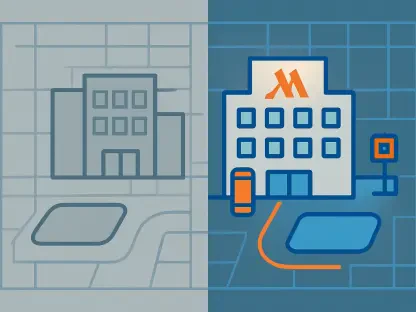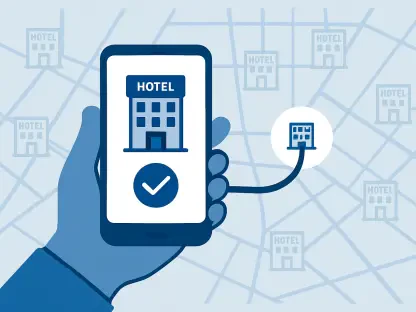The motel software market is poised for dramatic expansion over the coming decade. As the hospitality industry increasingly embraces digitalization, comprehensive software solutions for motels are becoming indispensable for operational efficiency and enhancing guest experiences. This potential for growth is driven by technological advancements and shifts in consumer behavior, among other factors.
Market Overview and Growth Projections
A Rapidly Expanding Market
HTF Market Intelligence forecasts a significant increase in the motel software market’s value, with an impressive compound annual growth rate (CAGR) of 12.5% through 2032. Such growth will see the market rise from 1.5 billion USD to a projected 3.4 billion USD by 2032, highlighting its robust prospective trajectory. This rapid expansion is propelled by a confluence of factors, including the evolution of digital tools that enhance operational efficiencies and improve guest experiences.
The motel industry is part of the broader hospitality sector, which has seen a surge in the adoption of technology-driven solutions. These software tools help streamline front-desk operations, manage reservations, and optimize revenue management. The adoption of such technologies is further accelerated by the growing trend of online bookings, which require sophisticated software systems for seamless processing and enhanced customer engagement. As technology continues to permeate the hospitality sector, the adoption of these solutions will become even more critical for motels aiming to stay competitive and relevant.
Driving Factors
This remarkable growth in the motel software market can be largely attributed to several driving factors. The increasing reliance on digital bookings and online travel platforms stands out as a key driver. The rise of online travel agencies and booking websites has resulted in a dramatic surge in digital reservations. To efficiently manage these digital bookings, motels are turning to sophisticated management solutions that streamline operations, manage guest preferences, and ensure seamless transaction processes.
Additionally, the integration of advanced technologies such as artificial intelligence (AI) and machine learning (ML) is enhancing the capability of these software solutions. By leveraging AI and ML, motel management software can provide personalized guest experiences, predicting guest needs and preferences, and ensuring that services are tailored to individual guests. Such technological advancements not only improve operational efficiency but also significantly enhance the guest experience, leading to higher levels of satisfaction and loyalty.
Key Players and Competitive Landscape
Major Market Players
Several prominent companies are leading the charge in the motel software market, including Oracle Hospitality, Cloudbeds, Hotelogix, and RMS Cloud. These industry giants are distinguished by their innovative approaches and comprehensive solutions, making them pivotal contributors to the market’s competitive landscape. Oracle Hospitality, for example, offers a suite of integrated solutions that streamline operations across different departments, enhancing efficiency and improving guest satisfaction.
Cloudbeds, another notable player, provides a cloud-based property management system that is highly scalable and easy to use. Its software solutions cater to a diverse range of lodging facilities, from independent motels to large chains. Hotelogix and RMS Cloud similarly offer comprehensive property management solutions that integrate core functions like booking, housekeeping, and maintenance management. These companies continue to play a crucial role in driving innovation and setting benchmarks for quality in the motel software market.
Strategies for Success
In a competitive market characterized by rapid innovation, these companies are continually advancing their offerings. This includes leveraging artificial intelligence, enhancing mobile compatibility, and ensuring robust cybersecurity measures. For instance, AI-driven solutions can help predict occupancy rates, manage dynamic pricing, and automate routine tasks, thus freeing up staff to focus on enhancing the guest experience.
Mobile compatibility is another critical aspect of modern motel management software. With an increasing number of users relying on their mobile devices for bookings and other travel-related activities, having a mobile-first approach is imperative. Additionally, robust cybersecurity measures are necessary to protect sensitive guest information and prevent data breaches. Many of these top players are also focusing on strategic partnerships and acquisitions to expand their service ranges and maintain a competitive edge. By aligning with other tech innovators or merging with companies that offer complementary services, these market leaders can offer more comprehensive, integrated solutions.
Market Segmentation and Applications
Diverse Software Types
The motel software market is segmented into various types of management solutions. Key categories include cloud-based motel management software, on-premise solutions, AI-powered booking, and revenue management systems. Each type addresses specific operational needs, offering tailored benefits to different kinds of lodging facilities. Cloud-based solutions, for instance, offer the advantage of remote accessibility and automatic updates, making them an attractive option for many motels.
On-premise solutions, while requiring more initial investment, offer greater control over data and customization options. AI-powered booking systems utilize machine learning algorithms to manage reservations more efficiently, predict demand, and optimize pricing strategies. Revenue management systems, on the other hand, focus on maximizing profitability by ensuring that room rates align with market demand and competitive positioning. Each software type is designed to address specific operational pain points, making it easier for motels to improve their efficiency and service quality.
Lodging Facility Applications
Software solutions are also segmented by their application across different lodging facilities. These range from independent motels to boutique hotels, highway lodging facilities, and multi-property chains. Each segment requires unique features and functionalities to meet their specific operational demands. Independent motels, for example, may prioritize user-friendly interfaces and cost-effective solutions that streamline their limited operations.
Boutique hotels, with their emphasis on unique guest experiences, may seek software that offers personalized service options and facilitates exceptional customer engagement. Highway lodging facilities might require efficient booking systems that can handle high turnover rates and provide real-time availability updates. Multi-property chains, on the other hand, need integrated solutions that offer centralized control over multiple sites while allowing for individual customization. By understanding the distinct needs of each segment, software providers can develop tailored solutions that address the unique challenges faced by different types of lodging facilities.
Market Trends and Innovations
AI and Personalization
One of the major trends reshaping the market is the implementation of AI-driven technologies, which enable more personalized guest experiences. By analyzing guest preferences and behavior, AI tools can offer tailored recommendations and services, increasing guest satisfaction and loyalty. These AI-driven systems can track guest interactions, preferences, and feedback to build comprehensive guest profiles.
With these profiles, motels can anticipate guest needs and provide customized services that enhance their stay. Whether it’s personalized room settings, tailored recommendations for local activities, or customized dining options, AI-driven personalization ensures that each guest feels valued and understood. Moreover, AI can help motels optimize their pricing strategies by analyzing market trends, historical data, and competitor rates, enabling them to set dynamic prices that maximize occupancy and revenue.
Mobile and Cloud Technologies
Mobile-first management tools and cloud-based property management software are also gaining traction. These technologies offer enhanced accessibility and scalability, allowing motel operators to manage their properties more efficiently and respond swiftly to changing market dynamics. With mobile-first management tools, staff can perform essential tasks on-the-go, such as checking guests in, managing reservations, and overseeing housekeeping operations, all from their mobile devices.
Cloud-based solutions, on the other hand, allow for seamless updates and integration with other systems, offering unmatched flexibility and scalability. These solutions eliminate the need for on-site servers and reduce the burden of maintenance, making them a cost-effective option for many motels. Cloud-based software also facilitates better data security and backup solutions, ensuring that critical information is protected and easily recoverable in case of any disruptions.
Growth Drivers and Challenges
Increased Digital Adoption
The primary growth drivers include the widespread adoption of digital solutions and the rising demand for contactless services. Health and safety concerns have placed a spotlight on contactless check-in, payment solutions, and automated guest services, driving the market for motel software. The push for contactless services has accelerated the adoption of technologies like mobile check-in, digital key cards, and automated payment systems, which minimize physical contact and enhance guest safety.
These innovations not only cater to health and safety concerns but also improve overall guest convenience and satisfaction. Additionally, the global increase in internet penetration and smartphone usage has made digital bookings more prevalent, necessitating the adoption of advanced management solutions. As digital tools become more ingrained in everyday life, motels that embrace these technologies will be better positioned to meet evolving guest expectations and improve their competitive standing.
Overcoming Barriers
Despite these positive trends, the market faces challenges such as high implementation and maintenance costs. Additionally, data privacy concerns and integration issues with legacy systems pose significant obstacles that need addressing through innovative solutions and robust cyber defenses. Implementing sophisticated motel management software requires significant investment in terms of both time and money.
Many smaller motels may find it difficult to justify these costs, especially when budget constraints are tight. Moreover, the increasing digitalization of operations raises concerns about data privacy and cybersecurity. Ensuring that guest data remains secure from breaches and unauthorized access is crucial. The integration of new software with existing legacy systems can also be complex and resource-intensive. These challenges necessitate continuous innovation, enhanced security measures, and comprehensive training programs to ensure a smooth transition to advanced management solutions.
Regional Insights
North America and Europe
Currently, North America and Europe dominate the motel software market, primarily due to their advanced technological infrastructure and a solid hospitality industry presence. These regions are at the forefront of adopting advanced software solutions, driven by a high level of digital literacy and widespread acceptance of innovative technologies. The strong hospitality sector in these regions provides a conducive environment for the growth of sophisticated motel management solutions.
Additionally, the presence of major software providers in North America and Europe ensures that motels in these areas have access to cutting-edge technologies and customizable solutions. The high competition among motels in these regions also drives the need for advanced software solutions that can enhance operational efficiency, improve guest experiences, and provide a competitive edge.
Asia-Pacific’s Rapid Growth
The motel software market is set for significant growth in the next decade. As the hospitality sector continues to adopt digital solutions, robust software for motels is becoming crucial for improving operational efficiency and guest satisfaction. This anticipated growth is primarily fueled by advancements in technology and the evolving behaviors of consumers. Increased reliance on smart devices and seamless online experiences has put pressure on motels to upgrade their technological infrastructure. Moreover, data analytics and AI are shaping personalized guest experiences, making modern software indispensable. As travelers seek more convenience and personalized service, motels are turning to comprehensive software solutions. These systems help in managing bookings, optimizing resources, and providing tailored experiences to guests. The demand for such technology is expected to rise as it offers motels a competitive edge in the market. The combination of efficiency and enhanced guest experiences positions the motel software market on a path of robust expansion.









